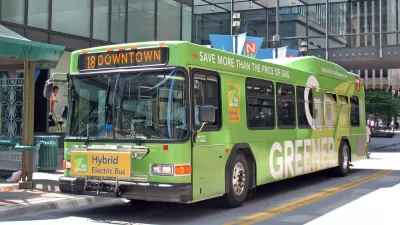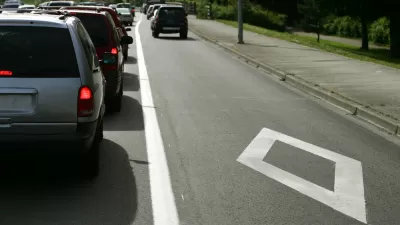The auto may no longer be "the quintessential symbol of American mobility, status and independence," opines Robert J. Samuelson for The Washington Post, as the latest demographic and auto ownership data point to a change in American mobility.

"Now there are signs that the car and its many offshoots (SUVs, pickup trucks) are losing their grip on the American psyche and pocketbook," writes Samuelson, economics columnist for The Post.
The car culture may be dying or, at any rate, slumping into a prolonged era of eclipse. The only question is whether the signs of change can be believed. It’s not clear.
Clearly SUVs and light trucks have not lost favor with American passenger vehicle consumers, as 2015 sales numbers show. Samuelson's observations do appear to hold up, though, for compact cars, hybrids, and electric vehicles, sadly (from an environmental perspective), as "crossovers replace the family car."
Fewer drivers
"Just recently, the Federal Highway Administration (FHWA) published figures — first reported on the Atlantic magazine’s CityLab website — indicating that the number of licensed drivers 16 or younger in 2014 had dropped 37 percent since 2009 and, at 1.08 million, was 'the lowest number since the 1960s," writes Samuelson.
More impressive, the trend seems long term. A report from the Highway Loss Data Institute [supported by the auto insurance industry] cites studies showing that from 1983 to 2010 the share of 16-year-olds with a license fell from 46 percent to 28 percent; over the same period, the share of licensed 17-year-olds declined from 69 percent to 46 percent .
"It's not only young adults who are delaying in getting drivers licenses, but a drop in licenses among [almost] all age groups according to a new analysis of license data from 1983-2014 by the University of Michigan Transportation Research Institute," notes a January post here. "The only age group to show a slight increase (in drivers licenses) since 2008 is the 70-and-older crowd," according to UMTRI."
Auto ownership
Samuelson provides various reasons for the decline in youths with drivers licenses, debated here as well, and points to "a new study by Federal Reserve economists Christopher Kurz, Geng Li and Daniel Vine...[that] suggests that most potential young buyers couldn’t afford a new vehicle or didn’t want to incur the debt and operating expenses of doing so. Economic considerations dominated." Of course, there's a major difference between getting a license and owning a motor vehicle.
Whether it be economic or cultural, the trends are pointing to a lessening in the nation's systemic auto addiction. But Samuelson ends on a sober tone.
"We simply don’t know," he writes, referring to the future of American mobility.
What we do know is that we are, to a large extent, prisoners of the past. The car created today’s residential geography, and it cannot be repealed simply or swiftly.
Hat tip to Kenyon Karl.
FULL STORY: Opinions: Is the car culture dying?

Alabama: Trump Terminates Settlements for Black Communities Harmed By Raw Sewage
Trump deemed the landmark civil rights agreement “illegal DEI and environmental justice policy.”

Planetizen Federal Action Tracker
A weekly monitor of how Trump’s orders and actions are impacting planners and planning in America.

The 120 Year Old Tiny Home Villages That Sheltered San Francisco’s Earthquake Refugees
More than a century ago, San Francisco mobilized to house thousands of residents displaced by the 1906 earthquake. Could their strategy offer a model for the present?

In Both Crashes and Crime, Public Transportation is Far Safer than Driving
Contrary to popular assumptions, public transportation has far lower crash and crime rates than automobile travel. For safer communities, improve and encourage transit travel.

Report: Zoning Reforms Should Complement Nashville’s Ambitious Transit Plan
Without reform, restrictive zoning codes will limit the impact of the city’s planned transit expansion and could exclude some of the residents who depend on transit the most.

Judge Orders Release of Frozen IRA, IIJA Funding
The decision is a victory for environmental groups who charged that freezing funds for critical infrastructure and disaster response programs caused “real and irreparable harm” to communities.
Urban Design for Planners 1: Software Tools
This six-course series explores essential urban design concepts using open source software and equips planners with the tools they need to participate fully in the urban design process.
Planning for Universal Design
Learn the tools for implementing Universal Design in planning regulations.
Clanton & Associates, Inc.
Jessamine County Fiscal Court
Institute for Housing and Urban Development Studies (IHS)
City of Grandview
Harvard GSD Executive Education
Toledo-Lucas County Plan Commissions
Salt Lake City
NYU Wagner Graduate School of Public Service




























